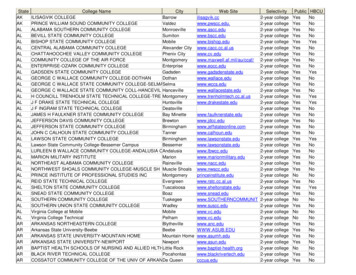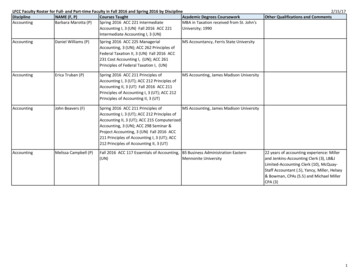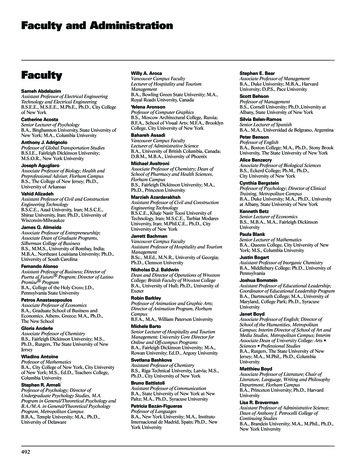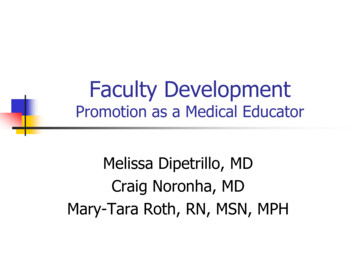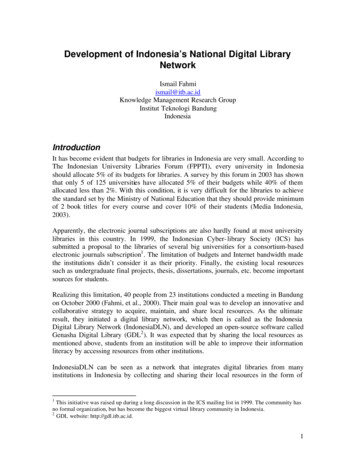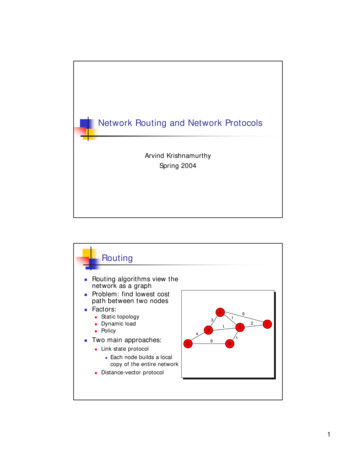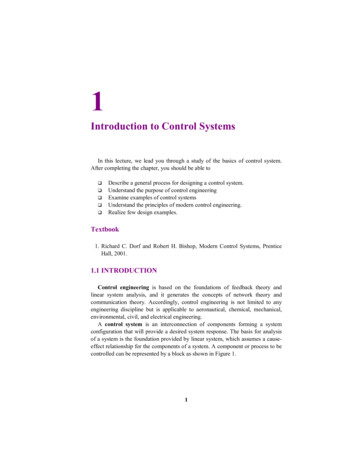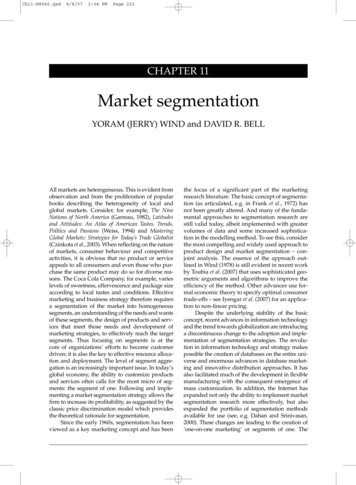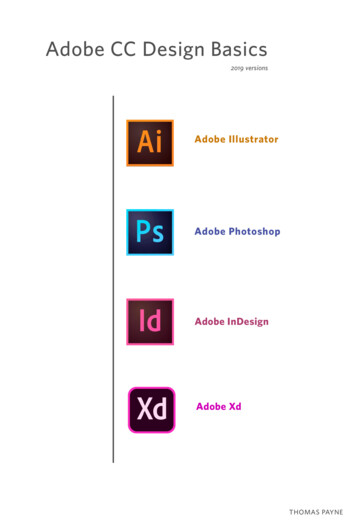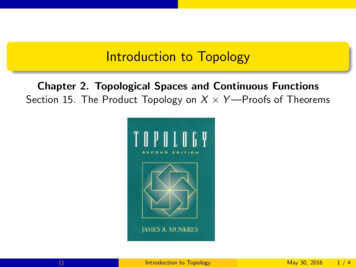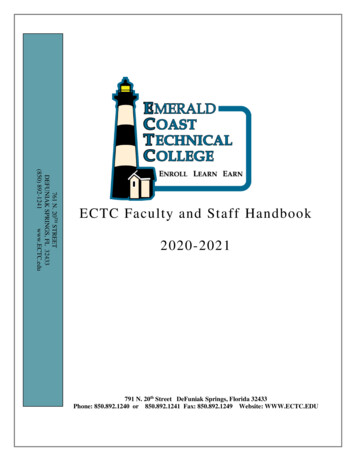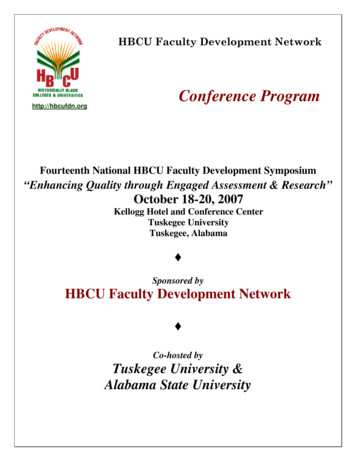
Transcription
HBCU Faculty Development Networkhttp://hbcufdn.orgConference ProgramFourteenth National HBCU Faculty Development Symposium“Enhancing Quality through Engaged Assessment & Research”October 18-20, 2007Kellogg Hotel and Conference CenterTuskegee UniversityTuskegee, Alabama Sponsored byHBCU Faculty Development Network Co-hosted byTuskegee University &Alabama State University
Fourteenth National HBCU Faculty Development Symposium“Enhancing Quality through Engaged Assessment & Research”October 18-20, 2007Kellogg Hotel and Conference CenterTuskegee UniversityTuskegee, Alabama October 18, 2007STEERING COMMITTEEDear Colleague:Hasan CrockettMorehouse CollegeThis Fourteenth National HBCU Faculty Development Symposium on“Enhancing Quality through Engaged Assessment & Research” places focus onthe importance of examining the outcomes of our instructional strategies todevelop the most effective approaches for enhancing teaching and learning, andalso for meeting the growing demands of accreditation organizations and grantfunders.Phyllis Worthy DawkinsJohnson C. Smith UniversityHenry J. FindlayTuskegee UniversityLaurette B. FosterPrairie View A&M UniversityEugene HermitteBringing the HBCU Faculty Development Symposium to Tuskegee gives usthe opportunity to visit an institution that is rich in history and that serves as asymbol of the ongoing struggle for equal rights and justice. We will also befocusing on nearby Montgomery with our visit to Alabama State University andthe showing of a documentary film on the women behind the Montgomery BusBoycott, followed by a panel discussion.Johnson C. Smith UniversityM. Shelly HunterNorfolk State UniversityStephen L. RozmanTougaloo CollegeEmeritusJoyce P. PeoplesAtlanta Metropolitan CollegeCarrell P. HortonFisk UniversityJesse J. SilverglateFlorida Memorial CollegeBarbara S. FrankleLeMoyne-Owen CollegeJ. Jonathan LewisTexas Southern UniversityCecelia Steppe-JonesNorth Carolina Central UniversityArgiro L. MorganXavier University of LouisianaNetwork Program CoordinatorGloria Dean RobertsWe welcome as keynote speaker Dr. Vincent Tinto, a national leader in theuse of learning communities and collaborative pedagogies to enhance studentlearning and retention. We also welcome the representatives from the WashingtonCenter for Improving the Quality of Undergraduate Education at the EvergreenState College who have worked closely with the HBCU Faculty DevelopmentNetwork in co-sponsoring learning community workshops and summer institutes.The preconference workshops are reflective of the conference theme, withsessions on assessment; learning communities; community-based participatoryresearch; research ethics and minority communities; and technology, assessment &professional development. The faculty development breakfast series and severalconcurrent sessions also focus on assessment and research.We thank both Tuskegee University and Alabama State University for theimportant roles they have played in the organization of the symposium and thehosting of activities.Sincerely,Steering CommitteeHBCU Faculty Development NetworkCO-DIRECTORSStephen L. RozmanTougaloo CollegeTougaloo, MS 39174Johnson C. Smith UniversityOffice (601) 977-4460Fax (601) 977-6148Phyllis Worthy Dawkins100 Beatties Ford Road, Charlotte, NC 28216srozman@aol.comOffice (704) 378-1287network@hbcufdn.orgFax (704) 378-1281pdawkins@jcsu.edu
PRECONFERENCE FORMATThursday, October 18, 20077:45 - 2:00 p.m.Registration – Tuskegee University at Kellogg Hotel & Conference Center8:30 - 9:45 a.m.10:00 - 12:00 noonFaculty Development Breakfast SeriesPreconference Concurrent Resource WorkshopsBallroom ATrack I:AssessmentBallroom AA.1 The ACPA ASK Standards: Framework for Assessment Skills and KnowledgeA.2 Developing and Assessing Learning Outcomes and Using Results for Program ImprovementTrack II: Learning CommunitiesMeeting Room BB.1 Learning Communities for STEM Academic Achievement: A Promising Pedagogical ReformB.2 Building on the Best: From Classroom to Program AssessmentTrack III: Community-Based Participatory ResearchC.1 Campus to Campus Partnerships: Co-Creating Models Integrating Service Learning with CBPRRoom C12:15 - 1:15 p.m. Preconference Resource Panel LuncheonBallroom BSpecial Presentation: “The History of Tuskegee University”1:30– 4:30 p.m.Preconference Concurrent Resource WorkshopsTrack IV:Research Ethics and Minority CommunitiesMeeting Rooms F & GTuskegee University National Center for Bioethics in Research and Health CareTrack V: Technology, Assessment & Professional DevelopmentMeeting Room CUsing the “Seven Principles of Good Practice” as Scaffolding for Program Improvement & Accreditation Self-Studies5:00 p.m.Bus Departs from Booker T. Washington Monument--Travel to Alabama State University5:45 - 6:45 p.m.Reception/Dinner in Fine Arts Building at Alabama State University7:00 – 8:30 p.m. Entertainment - Play entitled “Jitney” -- Tickets reserved for groupCONFERENCE FORMATFriday, October 19, 20077:45 - 4:00 p.m.8:30 - 9:45 a.m.Registration – Tuskegee University at Kellogg Hotel & Conference CenterFaculty Development Breakfast SeriesBallroom B10:00 – 11:00 a.m.11:15 - 12:15 a.m.Concurrent Sessions - Group IConcurrent Sessions - Group II12:30 - 1:45 p.m.Welcome/Luncheon Keynote – Vincent Tinto, Syracruse University2:00 – 3:00 p.m.2:00 – 3:00 p.m.3:15 - 4:15 p.m.Ballroom BConcurrent Sessions - Group IIIConcurrent Sessions - Group IIIConcurrent Sessions - Group IV5:00 -- 6:30 p.m. Networking Reception/Cash Bar, Book Signing, Film ScreeningAuditorium Foyer6:45 p.m. --Ballrooms A & BBuffet Dinner/Panel Discussion & After Dinner Social EventSaturday, October 20, 20078:00 - 12 noonRegistration – Tuskegee University at Kellogg Hotel & Conference Center8:30 - 9:45 a.m.Faculty Development Breakfast Series10:00 – 11:00 a.m.11:15 - 12:15 a.m.Concurrent Sessions - Group VConcurrent Sessions - Group VIPoster Session12:30 – 1:45 p.m.Luncheon Roundtables2:00 – 3:00 p.m.Concurrent Sessions - Group VIIDoor Prizes - Blackberry – donated by Verizon & other itemsTour of Tuskegee University – National Historic SiteBallroom BBallroom B FoyerBallrooms B & C
Fourteenth National HBCU Faculty Development SymposiumOctober 18-20, 2007Kellogg Hotel and Conference CenterTuskegee UniversityTuskegee, Alabama“Enhancing Quality through Engaged Assessment & Research”Co-hosted byTuskegee University &Alabama State UniversityPRECONFERENCEThursday, October 18, 20077:45 - 2:00 p.m.8:30 - 9:45 a.m.Registration – Tuskegee University at Kellogg Hotel & Conference CenterFaculty Development Breakfast SeriesBallroom AAssessment and the Quality Enhancement PlanEugene Hermitte, Acting Dean, Freshman-Sophomore Learning, Johnson C. Smith UniversityLinette Fox, Associate Vice President for Academic Affairs, Johnson C. Smith UniversityThis presentation will describe the approaches and strategies used by the leaders of the Quality EnhancementCommittee to involve the entire campus community in quickly developing a strong Quality Enhancement Plan.This Plan, which emphasizes student engagement was ultimately accepted by SACS. We will describe howstudents are taught to assess themselves and see the value of self-assessment. We will also present a componentfocusing on the use of reflection to see the link between freshman learning and future success. Finally, we willshow how we use electronic portfolios as a vehicle for the QEP.10:00 - 12:00 noonPreconference Concurrent Resource WorkshopsTrack I:Assessment (10:00 a.m. – 12 noon)Ballroom AA.1 The ACPA ASK Standards: Framework for Assessment Skills and KnowledgeArt R. Malloy, Dean of Students, Savannah College of Arts and DesignAmerican College Personnel AssociationThis will be an interactive presentation building on information presented first by PowerPoint or overheadslides, then allowing ample opportunity for audience comment and discussion. The presentation also contains anembedded opportunity (a “mini assessment”) for participants to identify areas of skill and knowledge in whichthey may desire further development.A.2 Developing and Assessing Learning Outcomes and Using Results for Program ImprovementShirley F. Manigault, Associate Dean, College of Arts & Sciences, Winston-Salem State UniversityElva J. Jones, Chair, Computer Science Department, Winston-Salem State UniversityOften data generated through assessment activities do not facilitate program improvement. In fact, as often asnot, no conclusions can be drawn from these data; or if problems are identified, there is no way to drill down totheir source. This interactive workshop will provide participants with models of learning outcomes andassessment methods, and engage them in developing or refining learning outcomes to yield usable results.
10:00 - 12:00 noonPreconference Concurrent Resource Workshops (continued)Track II: Learning Communities (10:00 a.m. – 12 noon)Meeting Room BB.1 Learning Communities for STEM Academic Achievement: A Promising Pedagogical ReformOrlando Taylor, Vice Provost for Research, Dean of Graduate School, Howard UniversityKimberley Freeman, Co-Project Director, LCSAA, Howard UniversityJill McGowan, Associate Professor, Mathematics, Howard UniversityArthur Bacon, Provost, Talladega CollegeTo work toward solving the national problem of African Americans being underrepresented in the fields ofscience, technology, engineering, and mathematics (STEM), Howard University, Jackson State University,Talladega College, and Xavier University, launched an innovative reform entitled Learning Communities forSTEM Achievement (LCSAA), which focuses on improving teaching and learning in STEM byimplementing “learning communities” among faculty and students. The panel will present the result ofdifferent learning communities implemented in STEM, as well as focus on future projects and partnerships.B.2 Building on the Best: From Classroom to Program AssessmentEmily Lardner, Co-Director, Washington Center for Improving the Quality of UndergraduateEducation, The Evergreen State College (Olympia, Washington)Gillies Malnarich, Co-Director, Washington Center for the Improving the Quality of UndergraduateEducation, The Evergreen State College (Olympia, Washington)Joye Hardiman, Tacoma Campus, The Evergreen State CollegePhyllis Worthy Dawkins, Director of Faculty Development Program, Dean of Professional Studies,Johnson C. Smith UniversityIn this interactive session, we will examine student written work using a structured protocol that builds on identifiedstrengths. Based on this conversation, participants will develop student, learning outcomes that matter to students andteachers. We will move from the classroom to an examination of program level assessment that includes meaningfultechniques for collecting data on student learning and assessing learning communities.Track III: Community-Based Participatory Research (10:00 a.m. – 12 noon)C.1 Campus to Campus Partnerships: Co-Creating Models Integrating Service Learning withCommunity-based Participatory ResearchHiram E. Fitzgerald, Associate Provost, University Outreach/Engagement, Michigan State UniversityLaurie Anne Van Egeren, Assistant Director, Outreach & Engagement, Michigan State UniversityAngela D. Allen, Graduate Research Assistant, National Center for the Study of University Engagement,Michigan State UniversityMakola Abdullah, Associate Professor of Civil Engineering and Associate Vice President for ResearchFlorida A&M UniversityClifton Addison, Jackson Heart Study, Jackson State UniversityHasan Crockett, Director, Bonner Office of Community Service, Professor of Political ScienceMorehouse CollegeAmelia Ross-Hammond, Coordinator, Service Learning & Civic Engagement, Norfolk State UniversityLaurette Blakey Foster, Faculty Development Director, Associate Professor of Mathematics,Prairie View A & M UniversityStephen Rozman, Director, Center for Civic Engagement & Social Responsibility, Tougaloo CollegeHenry Findlay, Professor & Director of Program Development, Continuing Education Program,Tuskegee UniversityThe “Campus to Campus Partnerships” model between Michigan State University and seven historically Blackcolleges and universities aims to build engaged, community-based participatory assessment, research, grantsmanship,and partnership development. An MSU faculty partner, HBCU faculty partners, and a MSU graduate student will sharetheir experiences in building this collaboration, including challenges, opportunities, and strategies that developed thetimeline, group dynamics, and implementation process. The audience is invited to provide feedback on the model andlearn how they can participate.
12:15 - 1:15 p.m.Preconference Resource Panel LuncheonBallroom BFacilitator: Henry J. Findlay, Tuskegee UniversitySpecial Presentation: “The History of Tuskegee University” – Professor Frank Toland1:30– 4:30 p.m. Preconference Concurrent Resource WorkshopsTrack IV:Research Ethics and Minority CommunitiesMeeting Rooms F & GTuskegee University National Center for Bioethics in Research and Health CareStephen Olufemi Sodeke, Interim Director of Center, Professor of Allied Health, Tuskegee UniversityCynthia Beaver Wilson, Resource Specialist, Tuskegee UniversityIsaac Mwase, Associate Professor of Philosophy Tuskegee UniversityLeonard W. Ortmann, Senior Associate for Programs, Tuskegee UniversityFaculty and staff of the Bioethics Center will conduct this pre-conference workshop. Its overall goal is toincrease the knowledge and skills of workshop participants to conduct responsible research with minoritycommunities. Specifically, it will: (1) Provide an overview of the Tuskegee University National Center forBioethics in Research and Health Care, (2) Discuss the work of the Bioethics Center in historical perspective,(3) Examine the United States Public Health Service Syphilis Study in Tuskegee and its legacy on research inminority communities, (4) Discuss traditional research ethics and principles, (5) Examine research ethics andprinciples from the perspectives of community-based participatory research and health disparities research, and(6) Enhance the skills of workshop participants in identifying and resolving ethical dilemmas in research.Track V: Technology, Assessment & Professional DevelopmentMeeting Room CUsing the “Seven Principles of Good Practice” as Scaffolding for Program Improvement andAccreditation Self-StudiesStephen Ehrmann, Vice President, TLT GroupFrank Parker, Director of Educational Technology, Johnson C. Smith UniversityIn this workshop, we will explore ways of using the seven principles for attractive, engaging facultydevelopment, for classroom assessment, and for productive program evaluation (i.e., program evaluation whosefindings provide direct guidance for how to improve learning in coming years). In the process we will learnabout some practical tools such as Flashlight Online (a survey system with an item bank of questions based inpart on the ‘seven principles,’ the National Survey of Student Engagement (a benchmarking and researchprogram that also draws in part on the seven principles), and GoogleDocs (a tool for collaborative work in thisworkshop and after participants head home). [1] To see the seven principles, and a variety of associatedresources, go to http://www.tltgroup.org/seven/home.htm Participants are advised to bring laptops so that theycan try out the tools and web sites we will discuss.3:00 – 3:15 Refreshment Break5:00 p.m.Pre-Function LoungeBus Departs from Booker T. Washington MonumentTravel to Alabama State University5:45 - 6:45 p.m.Reception/Dinner in Fine Arts Building at Alabama State University7:00 – 8:30 p.m.Entertainment - Tonea Stewart, actress and director of the theater, is directing aplay entitled “Jitney” -- Tickets reserved for groupBus departs to Tuskegee University
CONFERENCEFriday, October 19, 20077:45 - 4:00 p.m.Registration – Tuskegee University at Kellogg Hotel & Conference Center8:30 - 9:45 a.m.Faculty Development Breakfast SeriesBallroom BPublish or Perish: Eight Steps to Achieve Greater Publication ProductivityHenry J. Findlay, Professor & Director of Program Development, Continuing Education Program,Tuskegee UniversityToday, it is crucial for faculty to maintain a high level of scholarly productivity primarily because of the“creeping shift” in standards for tenure as well as post-tenure requirements. Under the academic adage “publishor perish,” faculty, especially at HBCUs, often struggle to conduct research studies and publish them inrecognized peer-reviewed journals. Many factors contribute to this dilemma: chief among them are the widerange of work responsibilities and the tax placed on the faculty members to teach effectively, conduct research,and engage in committee work and community service.10:00 – 11:00 a.m.Concurrent Sessions - Group I1A AEEnhancing Student Retention at HBCUs through Assessment and EvaluationCosmas U. Nwokeafor, Bowie State UniversityDonatus Uzomah, Bowie State UniversityKehbuma Langmia, Bowie State UniversityBallroom A1To design encouraging and motivating atmosphere that will entice these students to stay until they graduate,HBCUs should satisfy the following objectives: (i) provide an encouraging learning environment whichincludes an adequate learning and living culture, (ii) caring and student minded faculty, (iii) goal-oriented staffand caring administrative personnel, (iv) provide high-quality and affordable academic programs and supportservices for all students and most of all (v) a caring academic leader, all of which will be geared towardsattracting students to stay through the completion of their college programs. This study will review how reliableand transparent assessment and evaluation of both student work and university performance goals will become astrong imperative in developing a culture of student access and success in HBCUs.1B DGModerator: Enid B. Jones, Alabama State UniversityInternational Service Learning: Helping Students to Think GlobalRoberta J. Wilburn, Whitworth UniversityBallroom A2This presentation will examine how to help students to think globally while acting locally through thedevelopment and implementation international service learning courses by combining a civic engagementmodel with international studies. The presentation will include a case study that will be used as a point ofreference for discussion. Brainstorming, sharing success stories, effective strategies, as well as expressingproblems and concerns will be encouraged. The presenter will act as a facilitator of the group dialogue on thetopic of helping HBCU faculty develop globally competent graduates.Please return your completed evaluation forms to the session moderators.Doorprizes will be drawn from the conference & session evaluation forms.
Friday, October 19, 200710:00 – 11:00 a.m.Concurrent Sessions - Group I1C CDSJThe Big Picture: Crafting a Mandate for ChangePamela D. Gay, Alabama State UniversityGary I. Grandison, Alabama State UniversitySenobia D. Crawford, Alabama State UniversityAnnette M. Allen, Troy State University(continued)Ballroom A3Surveys undertaken by students in sociology classes at ASU and at Troy University Montgomery are excellentexamples of a change process at work while providing a real world view of the practice of housingdiscrimination, in and out of Alabama, both racially and non-racially biased. By examining human and capitalresources, testing and evaluating components of the desired change, and adjusting strategies and expectations asneeded, service-learning students are able to foster better real-estate lending practices in the city ofMontgomery, while applying sociological assessment strategies to real-life situations, while drawing oninstitutional strengths1D DGMeeting Room FTranscendence, Transformation, Transactual and Traditional Instructional Practices of Faculty at an HBCUClarissa Gamble Booker, Prairie View A & M UniversityPamela T. Barber-Freeman, Prairie View A & M UniversityClement Glenn, Prairi
Tougaloo College Tougaloo, MS 39174 Office (601) 977-4460 Fax (601) 977-6148 srozman@aol.com network@hbcufdn.org Phyllis Worthy Dawkins Johnson C. Smith University 100 Beatties Ford Road, Charlotte, NC 28216 Office (704) 378-1287 Fax (704) 378-1281 pdawkins@jcsu.edu Fourteenth National HBCU Faculty Development Symposium
